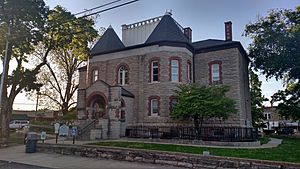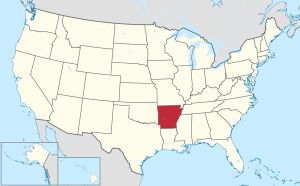Marion County, Arkansas facts for kids
Quick facts for kids
Marion County
|
|
|---|---|

Marion County courthouse in Yellville
|
|

Location within the U.S. state of Arkansas
|
|
 Arkansas's location within the U.S. |
|
| Country | |
| State | |
| Founded | September 25, 1836 |
| Named for | Francis Marion |
| Seat | Yellville |
| Largest city | Bull Shoals |
| Area | |
| • Total | 640 sq mi (1,700 km2) |
| • Land | 597 sq mi (1,550 km2) |
| • Water | 43 sq mi (110 km2) 6.8%% |
| Population
(2020)
|
|
| • Total | 16,826 |
| • Estimate
(2023)
|
17,514 |
| • Density | 26.29/sq mi (10.15/km2) |
| Time zone | UTC−6 (Central) |
| • Summer (DST) | UTC−5 (CDT) |
| Congressional district | 1st |
Marion County is located in the Ozark Mountains in the U.S. state of Arkansas. The county is named for Francis Marion, the famous "Swamp Fox" of the Revolutionary War. Created as Arkansas's 35th county in 1836, Marion County is home to one incorporated town and four incorporated cities, including Yellville, the county seat. The county is also the site of numerous unincorporated communities and ghost towns. The county included part of what is now Searcy County, Arkansas, with many opposing to dividing them, which helped fueled the bloody Tutt-Everett War between 1844 and 1850.
Occupying 640 square miles (170,000 ha), the county's population was 16,826 as of the 2020 Census. Based on population, the county ranks 42nd of the 75 in Arkansas. Located in the Ozarks, the county is largely covered with rugged terrain and waterways, with the exception of King's Prairie in the southwestern portion. It is drained by the White River, Buffalo River, Crooked Creek, and the Little North Fork of White River. Protected areas of the county include Bull Shoals-White River State Park, Ozark National Forest, the Buffalo National River and four wildlife management areas (WMAs).
Although no Interstate highways are located in Marion County, two United States highways (U.S. Route 62 [US 62] and US 412) and eight Arkansas state highways run in the county.
Contents
History
Prior to white settlement, the Ozark Plateau was inhabited by the Osage Indians for centuries. Present-day Arkansas was under French rule from 1682 until the Spanish took over in 1762. The territory was returned to France in 1800 and then sold to the United States as part of the Louisiana Purchase in 1803. In 1812, the Territory of Missouri was formed, containing all of the Louisiana Purchase except the modern state of Louisiana. To manage this expansive and sparsely populated territory, counties were formed. New Madrid County, Missouri covered much of southeastern Missouri and the northern part of Arkansas. This county was eventually subdivided into Lawrence County, which was later subdivided into Izard County.
Marion County was formerly home to a large zinc mining industry. The ruins of the Rush Creek mining district are preserved as the Rush Historic District, which is listed on the National Register of Historic Places.
Geography
According to the U.S. Census Bureau, the county has a total area of 640 square miles (1,700 km2), of which 597 square miles (1,550 km2) is land and 43 square miles (110 km2) (6.8%) is water.
Adjacent counties
- Ozark County, Missouri (north)
- Baxter County (east)
- Searcy County (south)
- Boone County (west)
- Taney County, Missouri (northwest)
National protected areas
- Buffalo National River (part)
- Buffalo National River Wilderness
- Ozark National Forest (part)
Demographics
| Historical population | |||
|---|---|---|---|
| Census | Pop. | %± | |
| 1840 | 1,325 | — | |
| 1850 | 2,308 | 74.2% | |
| 1860 | 6,192 | 168.3% | |
| 1870 | 3,979 | −35.7% | |
| 1880 | 7,907 | 98.7% | |
| 1890 | 10,390 | 31.4% | |
| 1900 | 11,377 | 9.5% | |
| 1910 | 10,203 | −10.3% | |
| 1920 | 10,154 | −0.5% | |
| 1930 | 8,876 | −12.6% | |
| 1940 | 9,464 | 6.6% | |
| 1950 | 8,609 | −9.0% | |
| 1960 | 6,041 | −29.8% | |
| 1970 | 7,000 | 15.9% | |
| 1980 | 11,334 | 61.9% | |
| 1990 | 12,001 | 5.9% | |
| 2000 | 16,140 | 34.5% | |
| 2010 | 16,653 | 3.2% | |
| 2020 | 16,826 | 1.0% | |
| 2023 (est.) | 17,514 | 5.2% | |
| U.S. Decennial Census 1790–1960 1900–1990 1990–2000 2010 |
|||
2020 census
| Race | Number | Percentage |
|---|---|---|
| White (non-Hispanic) | 15,414 | 91.61% |
| Black or African American (non-Hispanic) | 20 | 0.12% |
| Native American | 127 | 0.75% |
| Asian | 56 | 0.33% |
| Other/Mixed | 830 | 4.93% |
| Hispanic or Latino | 379 | 2.25% |
As of the 2020 United States census, there were 16,826 people, 6,782 households, and 4,438 families residing in the county.
Communities
Cities
- Bull Shoals
- Flippin
- Summit
- Yellville (county seat)
Town
Census-designated places
Townships
Note: Unlike most Arkansas counties, Marion County only has one single township (named "Marion County"). That township encompasses the entire county.
Townships in Arkansas are the divisions of a county. Each township includes unincorporated areas; some may have incorporated cities or towns within part of their boundaries. Arkansas townships have limited purposes in modern times. However, the United States Census does list Arkansas population based on townships (sometimes referred to as "county subdivisions" or "minor civil divisions"). Townships are also of value for historical purposes in terms of genealogical research. Each town or city is within one or more townships in an Arkansas county based on census maps and publications. The townships of Marion County are listed below; listed in parentheses are the cities, towns, and/or census-designated places that are fully or partially inside the township.
- Marion County
Infrastructure
Major highways
 US 62
US 62 US 412
US 412 U.S. Route 62 Business
U.S. Route 62 Business U.S. Route 62 Spur
U.S. Route 62 Spur Highway 14
Highway 14 Highway 101
Highway 101 Highway 125
Highway 125 Highway 178
Highway 178 Highway 202
Highway 202 Highway 206
Highway 206 Highway 235
Highway 235 Highway 268
Highway 268 Airport Highway 980
Airport Highway 980
See also
 In Spanish: Condado de Marion (Arkansas) para niños
In Spanish: Condado de Marion (Arkansas) para niños
 | May Edward Chinn |
 | Rebecca Cole |
 | Alexa Canady |
 | Dorothy Lavinia Brown |


